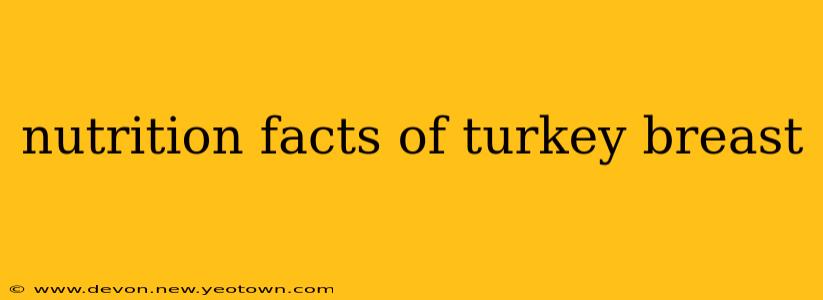Turkey breast, a lean protein staple in countless kitchens worldwide, isn't just a Thanksgiving favorite; it's a nutritional powerhouse packed with benefits for your health. This isn't your grandma's dry turkey; we're diving deep into the nutritional facts, exploring the variations, and answering your burning questions about this versatile meat.
Imagine this: you're preparing a healthy lunch, and the star of the show is a juicy slice of turkey breast. But what exactly are you consuming? Let's unravel the mystery of its nutritional profile.
What are the nutritional benefits of turkey breast?
Turkey breast boasts a remarkably low-fat profile while being an excellent source of high-quality protein. This lean protein is crucial for building and repairing tissues, supporting a healthy immune system, and keeping you feeling full and satisfied. But it’s not just about protein; turkey breast offers a good dose of essential vitamins and minerals, including niacin, selenium, and vitamin B6, all vital for energy production and overall well-being.
Think of it as nature's multivitamin, neatly packaged in a delicious and versatile protein source. The benefits extend beyond the plate, influencing everything from muscle growth to cognitive function.
How many calories are in 3 oz of turkey breast?
A typical 3-ounce serving of cooked turkey breast contains around 120-150 calories. This can vary slightly depending on the preparation method (roasting, grilling, etc.) and whether the breast is skinless (highly recommended for minimizing fat). This relatively low calorie count makes it an ideal choice for weight management and those looking to maintain a healthy diet. The low-calorie, high-protein composition is particularly effective at keeping hunger at bay.
Is turkey breast a good source of protein?
Absolutely! Turkey breast is an exceptional source of high-quality protein, meaning it contains all nine essential amino acids our bodies need but cannot produce on their own. These amino acids are the building blocks of proteins, essential for various bodily functions, including muscle growth, repair, and hormone production. A single serving delivers a significant portion of your daily protein needs, making it perfect for athletes, active individuals, and anyone aiming to maintain optimal muscle mass.
What are the differences in nutrition between white and dark turkey meat?
While both offer protein and nutrients, dark turkey meat (from the thighs and legs) contains significantly more fat and calories than white turkey breast. The dark meat also has a higher iron content. The choice depends on individual dietary preferences and goals. For those aiming for a leaner option, white turkey breast is the clear winner. However, dark meat shouldn't be entirely dismissed; it offers a different nutritional profile, and incorporating it in moderation can be beneficial.
What are some healthy ways to prepare turkey breast?
The versatility of turkey breast is a huge plus. Beyond the traditional roast, you can grill, bake, pan-fry, or even add it to salads and sandwiches. Seasoning options are endless, enabling culinary creativity without compromising the nutritional value. To enhance flavor without adding excessive calories, opt for herbs, spices, and citrus juices instead of heavy sauces. Consider using lean cooking methods, such as baking or grilling, to minimize added fat.
How much turkey breast should I eat per day?
There’s no single "magic number" for daily turkey breast consumption. The ideal amount depends on individual factors like age, activity level, overall diet, and health goals. Consult a nutritionist or dietitian for personalized dietary advice to determine the appropriate amount of turkey breast (and protein in general) to incorporate into your daily diet.
Is turkey breast healthier than chicken breast?
Both turkey and chicken breast are lean protein sources with a similar nutritional profile. Turkey breast often slightly edges out chicken in terms of selenium and niacin content. Ultimately, both are healthy choices, and the “healthier” option depends on personal preferences and dietary needs. The best approach is to incorporate a variety of lean protein sources into your diet.
In conclusion, turkey breast stands out as a versatile and nutritious option for a healthy diet. Its lean protein, low-fat content, and impressive vitamin and mineral profile make it a valuable addition to any meal plan. From simple salads to elaborate dinners, this nutritional powerhouse offers a delicious and healthful way to fuel your body and achieve your wellness goals.

